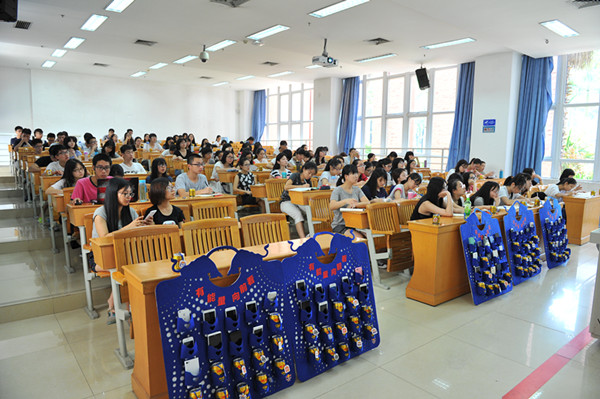Red Bull for phones swap helps students focus
 |
|
Students can now "trade" the right to use their phones during class for a can of red Bull in more than 10 colleges across China. [Photo provided to chinadaily.com.cn] |
It's common to see students in class at universities focusing on their smartphones while their professors seem to be talking to the air. Smartphones and social media have changed people's lifestyles, and not all are good changes.
A drinks company has come up with a solution of how to make such students put away their beloved phones and concentrate on their lesson. Recently, in more than 10 colleges across China, students were able to "trade" the right to use their phones during class for a can of red Bull. Replacing a device students seem unable to step away from with a favorite beverage is a new and creative idea.
The company puts an "energy pocket" at the front of the classroom, which looks like a multilayered storage bag, with drinks in each pocket. To buy into the exchange, students take a can of Red Bull and place their phone in the pocket. They can retrieve the phone after the class. The "trading" has been covered by major media outlets in China and is also a hot topic on social media.
"The post-'90s generation is quite rebellious," said a student from Jinan University in Guangzhou, Guangdong province. "We don't feel happy or comfortable if you come and take away our stuff. But if there is more than one option, if we can choose to trade one thing for another, we will buy that. It is more like an interaction."
The student market is one that fast-moving consumer goods companies compete energetically for. According to mass communications experts, young people, especially those with higher education, are more open to new things and willing to share things they find interesting with their peers, which makes them ideal for word of mouth communication. They are also willing to get involved in creative activities.
Members of this group, according to experts, are the mainstream consumers of the future. While they are young is when their ideas and loyalty to brands and products can be easily shaped. With the higher education they are getting, they are also likely to become high-income earners in the future.
Experts suggest that if companies can discover what this group really needs and offer products and services tailored to those needs, they can tap into the market quickly.
Companies have now figured out how to more accurately capture the attention of students and sell them on brand value.
Ding Junjie, a professor of advertising at the Communication University of China, said the message Red Bull is conveying, that "your energy is beyond your imagination", fits with what the students feel when they separate from their phones and turn their attention to the lecture.
"It is an innovative way of communicating with students. Companies should produce more events like this one, which is a great combination of the company value and trendy issues," Ding said.
Gu Hong, an associate professor at the journalism and communications school of Jinan University, said the idea of energy promoted by Red Bull is about having a positive attitude toward life, such as being more attentive and focused on one thing.
According to feedback from teachers, students became more involved in class activities after the event.


















